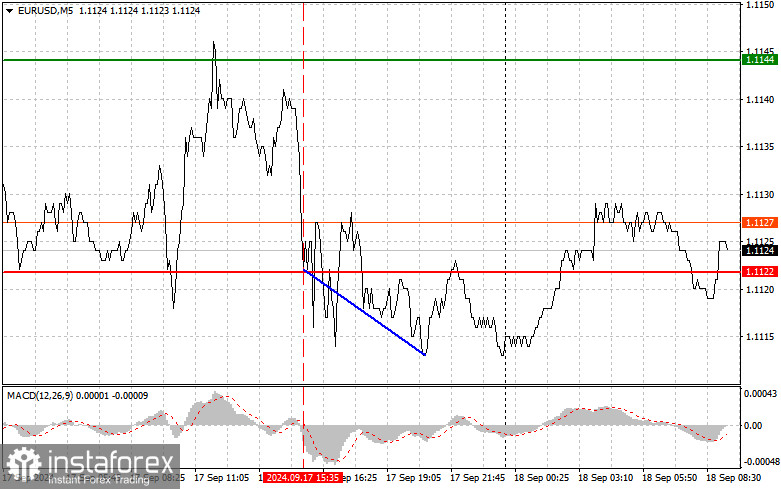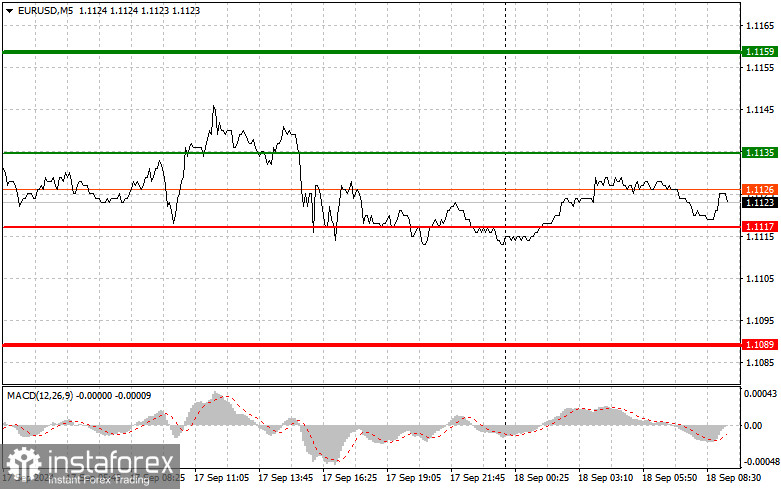Trade Analysis and Tips for Trading the Euro
The price test at 1.1122 occurred just as the MACD indicator began moving downward from the zero mark, confirming a valid entry point for selling the euro. However, after a 10-pip decline, the pressure on the trading instrument eased. Yesterday's data on business sentiment indices from the ZEW Institute in the Eurozone exerted pressure on the euro in the first half of the day, which continued during the U.S. trading session following strong U.S. retail sales data.
Today, attention should be paid to the Eurozone's Consumer Price Index and the core CPI, excluding energy and food. Only lower-than-expected figures could lead to a drop in the euro. Otherwise, everyone will be awaiting the Federal Reserve's decision on interest rates, which we will discuss in more detail in the afternoon forecast. It would also be worth listening to the interview with European Central Bank board member Joachim Nagel, although he is unlikely to say anything new. As for the intraday strategy, I will rely more on the implementation of scenarios No. 1 and 2.

Buy Signal
Scenario No 1: Today, you can buy the euro when the price reaches around 1.1135 (green line on the chart), with a target of rising to the 1.1159 level. At 1.1159, I plan to exit the market and sell the euro in the opposite direction, expecting a movement of 30-35 pips from the entry point. The euro's growth can be anticipated in the first half of the day as the bullish momentum continues. Important! Before buying, ensure the MACD indicator is above the zero mark and beginning to rise.
Scenario No 2: I also plan to buy the euro today if there are two consecutive tests of the 1.1117 price when the MACD indicator is in the oversold area. This will limit the pair's downward potential and lead to an upward market reversal. Growth can be expected towards the opposing levels of 1.1135 and 1.1159.
Sell Signal
Scenario No 1: I plan to sell the euro after the price reaches 1.1117 (red line on the chart). The target will be 1.1089, where I plan to exit the market and immediately buy in the opposite direction (expecting a 20-25 pip movement in the opposite direction from the level). Pressure on the pair may return today if the price fails to break above the daily high and Eurozone data are weak. Important! Before selling, make sure the MACD indicator is below the zero mark and beginning to decline.
Scenario No 2: I also plan to sell the euro today in case of two consecutive tests of the 1.1135 price when the MACD indicator is in the overbought area. This will limit the pair's upward potential and lead to a market reversal downward. A decline can be expected toward the opposing levels of 1.1117 and 1.1089.

What's on the Chart:
Thin green line: the entry price at which you can buy the trading instrument.
Thick green line: the estimated price at which you can set Take Profit or manually secure profits, as further growth above this level is unlikely.
Thin red line: the entry price at which you can sell the trading instrument.
Thick red line: an estimated price at which you can set Take Profit or manually secure profits, as further decline below this level is unlikely.
MACD indicator: when entering the market, it is essential to be guided by overbought and oversold zones.
Important: Novice traders in the forex market must be very cautious when deciding to enter the market. It is best to stay out of the market before important fundamental reports are released to avoid sharp price fluctuations. If you choose to trade during news releases, always set stop orders to minimize losses. Without setting stop orders, you can quickly lose your entire deposit, especially if you don't use money management and trade in large volumes.
Remember, a clear trading plan, like the one I've outlined, is essential for successful trading. Making impulsive decisions based on the current market situation is a losing strategy for novice intraday traders.
 English
English 
 Русский
Русский Bahasa Indonesia
Bahasa Indonesia Bahasa Malay
Bahasa Malay ไทย
ไทย Español
Español Deutsch
Deutsch Български
Български Français
Français Tiếng Việt
Tiếng Việt 中文
中文 বাংলা
বাংলা हिन्दी
हिन्दी Čeština
Čeština Українська
Українська Română
Română

